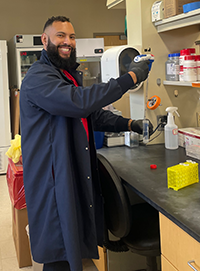The D-SPAN award consists of two stages of support. The initial stage aids PhD students in completing their dissertations over 1-2 years, while the second stage facilitates their transition to neuroscience research postdoctoral positions, extending up to four years. Notably, the program also offers assistance in planning long-term career goals, recognizing the importance of sustained support in the challenging field of neuroscience.
Meet Brown’s D-SPAN Scholars:
 Sinda Fekir, a doctoral candidate in Neuroscience, is set to complete her degree this spring and start a postdoctoral position in Virginia next fall.
Sinda Fekir, a doctoral candidate in Neuroscience, is set to complete her degree this spring and start a postdoctoral position in Virginia next fall.
Fekir's thesis explores the intricate relationship between dopamine cells from the Ventral Tegmental Area (VTA) and changes in blood-brain barrier (BBB) permeability using systems level neuroscience imaging techniques. Her findings reveal the rapid communication between this cell type and brain vasculature, impacting BBB permeability at a time-scale relevant to neuronal activity and behavior.
Post-graduation, Fekir plans to transition into human research. She feels well-prepared due to the support and knowledge gained through the D-SPAN fellowship.
She expresses, “Receiving the DSPAN fellowship has been life-changing for me. The knowledge and support I've gained, in addition to the fellowship's funds, are giving me freedom and opportunities concerning where to go and what to do for my postdoctoral work.”
Taylor Wise, a doctoral candidate in Psychology, received a D-SPAN award in 2022. The award has been instrumental in her pursuit of becoming an independent principal investigator in academia. “Not only has the DSPAN award supported me in terms of funding present and future research, but it has also connected me with a community of young neuroscientists who strive for diverse representation within the field,” says Wise. 
Her research focuses on how the posterior parietal cortex (PPC) region of the brain functions as it relates to spatial and social cognition. She explains that more work is needed to understand when the PPC is necessary for multisensory processing. By combining a novel behavioral paradigm and advanced chemogenetic inactivation techniques, her work takes a unique perspective in understanding how spatial and social information may be similarly processed in this area of the brain.
After graduation, Wise will be joining Dr. Steve Chang's lab at Yale University as a K00 postdoctoral associate. While there, she will investigate the neural mechanisms of social interaction in non-human primates. Her long-term goal is to secure a tenure-track faculty position at an R1 institution, where she hopes to further explore questions of social behavioral neuroscience and mentor individuals underrepresented in the field.
Reflecting on the impact of the D-SPAN award, Wise emphasizes, “those involved in DSPAN continually demonstrate a genuine investment in one another and are cultivating an environment where those historically left out of neuroscience can thrive.”
 Kelvin De Leon, a doctoral candidate in Neuroscience, is currently investigating different mutations on the plasma membrane citrate transporter (SLC13A5) and their association with early infantile epileptic encephalopathy (EIEE). His research will contribute to the understanding of the dysfunction associated with the mutations in SLC13A5 at the behavioral, circuit, and cellular levels.
Kelvin De Leon, a doctoral candidate in Neuroscience, is currently investigating different mutations on the plasma membrane citrate transporter (SLC13A5) and their association with early infantile epileptic encephalopathy (EIEE). His research will contribute to the understanding of the dysfunction associated with the mutations in SLC13A5 at the behavioral, circuit, and cellular levels.
“My ultimate goal is to have the work that I’m doing help guide therapy so that the SLC13A5 epilepsy patients can have a cure in the near future,” says De Leon.
The DSPAN award has helped De Leon to gain skills in electrophysiology, molecular neuroscience, and computational analysis, which will help him in his postdoctoral fellowship after graduation. He is interested in continuing his training in translational neuroscience and working with vulnerable populations. He was also selected in 2022.
“This award has provided me with the funding security that allows me to be successful in producing rigorous and responsible research. The skills I have been able to acquire through my research will contribute to improving the health of patients,” says De Leon.
Neuroscience candidate Kimberly Rose Madhwani is the fourth outstanding D-SPAN recipient currently at Brown. For more details about all the awardees, visit the NIH Blueprint for Neuroscience Research webpage.
The D-SPAN Award has not only supported these scholars financially but has also played a crucial role in building a vibrant and supportive scientific community. Through initiatives like D-SPAN, Brown University is contributing to the diversification and excellence of the neuroscience field, ensuring that talent and innovation flourish irrespective of background or identity.